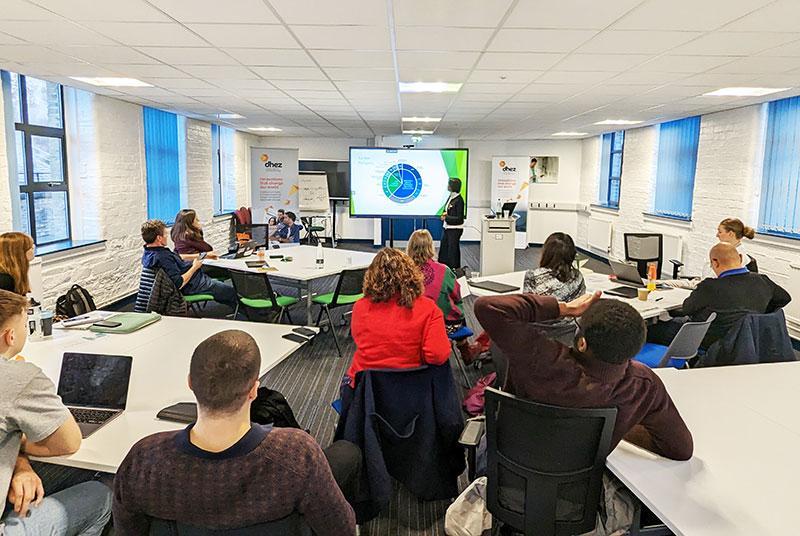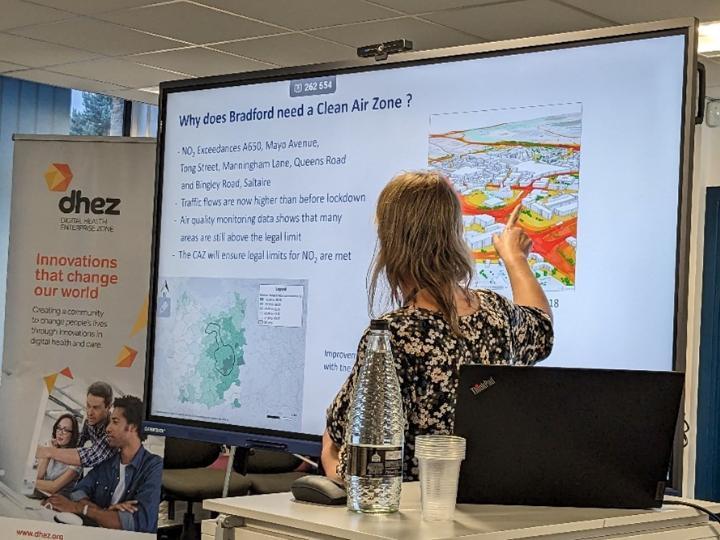Air Pollution and Public Health Research Network event
On the 15 November 2023, the DHEZ hosted the first ‘Air Pollution & Public Health’ research networking event organised by Dr Jacobo Elies (ICT, Faculty of Life Sciences) with the aim of bringing together experts from different academic specialities and professional sectors.
Attendees enjoyed a productive and promising networking session after a series of presentations, summarised below.

Attendees at the air pollution and public health event watching a presentation.
Prof Jim McQuaid [Institute for Climate and Atmospheric Science, University of Leeds] gave a talk about types of air pollutants (aerosols such as particulate matter, and gases such as NO2, CO, and SO2). He also explained the diverse sources from where air pollutants can disperse and concentrate in our communities.
Courtney Riley (Faculty of Life Sciences – Institute of Cancer Therapeutics, UoB) is currently investigating the molecular mechanisms by which pollutant gases affect cardiac conduction. Clinical evidence has shown that exposure to air pollution increases the risk of cardiac arrhythmias, however very little is known about how pollutant gases affect heart function. Courtney is conducting this research as part of her PhD project under the supervision of Jacobo Elies (Cardiovascular Research Group, ICT, Faculty of Life Sciences, UoB).
Prof Lucie Middlemiss (Sustainability Research Institute, School of Earth and Environment, University of Leeds) talked about ‘Fuel (or Energy) Poverty and Health’. Lucie explained that ‘fuel poverty’ is any form of lack of access to any type of energy (also called “Energy poverty”); which in the UK is mainly indoor heating.
Teumzghi Mebrahtu (Senior Research Fellow Statistician, Born in Bradford) presented his recent research about the correlation between exposure to air-pollutants and respiratory illness. Teumzghi explained the participants of the study were patients who visited general practice (GP) physician in Bradford metropolitan district and the Bradford Royal Infirmary hospital accident and emergency (A&E) service between January 01, 2018 and December 31, 2021. The team used daily records of NO2, PM2.5 and PM10 and number of GP + A&E visits for respiratory illness over four years.
The results indicated that the effects of NO2 clearly correlate with short-term (immediate) and long-term (delayed) visits for respiratory diseases. Importantly, this study provides value to health care providers to understand the length of time in which increased health service use might be apparent after air pollution episodes.
Sally Jones (Monitoring and Evaluation Manager, Bradford Council Clean Air programme) gave a talk about the Bradford Clear Air Zone (CAZ). She shared unpublished data regarding the positive effects that this programme brought to Bradford city centre in dropping the average levels of NO2 and PM2.5 from 2021 to 2022. Interestingly, that drop coincided with a significantly reduced number of asthma-related hospital visits from children and young people.
Hawarun Hussain (Senior Programme Manager, NHS England Net Zero in Yorkshire & North East) gave a talk about the NHS decarbonisation plans and provided an update of the delivery of Net Zero NHS. She explained that the NHS has set two targets: 1) NHS Carbon Footprint aims to reach net zero by 2040 for the emissions the NHS control directly, with an ambition to reach an 80% reduction by 2028 to 2032, and 2) NHS Carbon Footprint Plus aims to reach net zero by 2045 for the emissions the NHS can influence, with an ambition to reach an 80% reduction by 2036 to 2039. https://www.england.nhs.uk/greenernhs/a-net-zero-nhs/

Sally Jones presenting at the air pollution research network event.
Background to the event
Air pollution has direct impacts on the natural environment, contributing to climate change, reducing crop yields and polluting oceans. Air pollution also impacts in human health at every stage of our lives . The focus on this network is advancing research to minimise the impact of air pollution in public health.
The landscape associated with air pollution is complex: There are many types of air pollutants, and their dispersion is influenced by many factors (wind, rain, temperature, etc.). Although there are natural sources of pollutants, the majority of air pollutants we breath come from a multifarious conglomerate of human activities.
There is an urgent need to decrease air pollutant emissions and this needs to be addressed in a holistic way.
Get involved
From organiser Jacobo Elies:
"We're excited to continue the discussion on how to tackle the climate crisis, air pollution and their impact in our lives and we are planning to organise another event in the new year to develop multidisciplinary research projects.
We're looking for experts on topics such as:
- Climate change action
- Impact of climate change/ air pollution in health, food and water security
- Prevention action (promoting wellbeing / transitioning into healthier lifestyles)
- Adaptation to climate change actions
- Clinical expertise"
If you want to share your insights, learn from others, and collaborate in research projects please contact Jacobo: [email protected].

